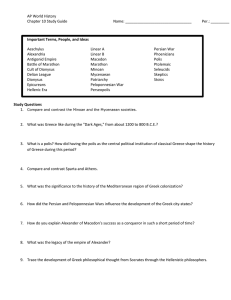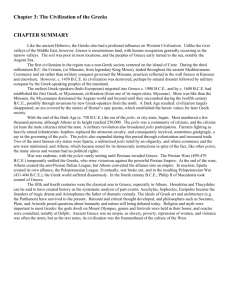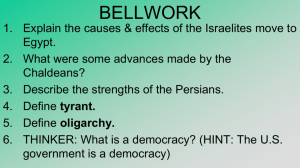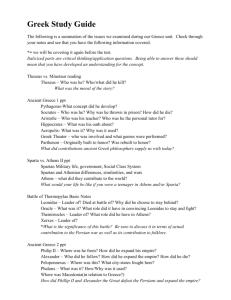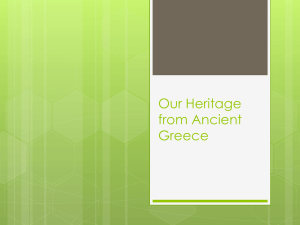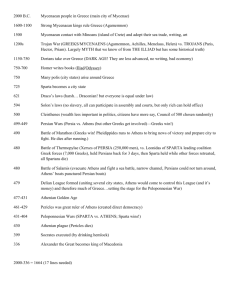Greek Learning Outcomes
advertisement
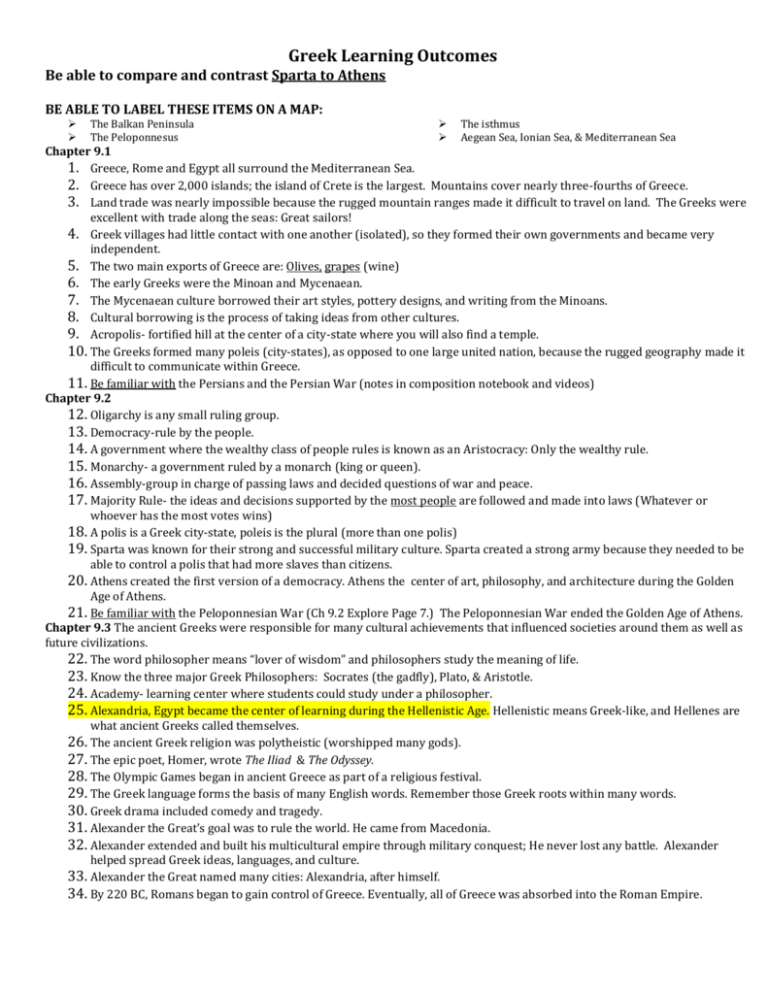
Greek Learning Outcomes Be able to compare and contrast Sparta to Athens BE ABLE TO LABEL THESE ITEMS ON A MAP: The Balkan Peninsula The Peloponnesus The isthmus Aegean Sea, Ionian Sea, & Mediterranean Sea Chapter 9.1 1. Greece, Rome and Egypt all surround the Mediterranean Sea. 2. Greece has over 2,000 islands; the island of Crete is the largest. Mountains cover nearly three-fourths of Greece. 3. Land trade was nearly impossible because the rugged mountain ranges made it difficult to travel on land. The Greeks were excellent with trade along the seas: Great sailors! 4. Greek villages had little contact with one another (isolated), so they formed their own governments and became very independent. 5. The two main exports of Greece are: Olives, grapes (wine) 6. The early Greeks were the Minoan and Mycenaean. 7. The Mycenaean culture borrowed their art styles, pottery designs, and writing from the Minoans. 8. Cultural borrowing is the process of taking ideas from other cultures. 9. Acropolis- fortified hill at the center of a city-state where you will also find a temple. 10. The Greeks formed many poleis (city-states), as opposed to one large united nation, because the rugged geography made it difficult to communicate within Greece. 11. Be familiar with the Persians and the Persian War (notes in composition notebook and videos) Chapter 9.2 12. Oligarchy is any small ruling group. 13. Democracy-rule by the people. 14. A government where the wealthy class of people rules is known as an Aristocracy: Only the wealthy rule. 15. Monarchy- a government ruled by a monarch (king or queen). 16. Assembly-group in charge of passing laws and decided questions of war and peace. 17. Majority Rule- the ideas and decisions supported by the most people are followed and made into laws (Whatever or whoever has the most votes wins) 18. A polis is a Greek city-state, poleis is the plural (more than one polis) 19. Sparta was known for their strong and successful military culture. Sparta created a strong army because they needed to be able to control a polis that had more slaves than citizens. 20. Athens created the first version of a democracy. Athens the center of art, philosophy, and architecture during the Golden Age of Athens. 21. Be familiar with the Peloponnesian War (Ch 9.2 Explore Page 7.) The Peloponnesian War ended the Golden Age of Athens. Chapter 9.3 The ancient Greeks were responsible for many cultural achievements that influenced societies around them as well as future civilizations. 22. The word philosopher means “lover of wisdom” and philosophers study the meaning of life. 23. Know the three major Greek Philosophers: Socrates (the gadfly), Plato, & Aristotle. 24. Academy- learning center where students could study under a philosopher. 25. Alexandria, Egypt became the center of learning during the Hellenistic Age. Hellenistic means Greek-like, and Hellenes are what ancient Greeks called themselves. 26. The ancient Greek religion was polytheistic (worshipped many gods). 27. The epic poet, Homer, wrote The Iliad & The Odyssey. 28. The Olympic Games began in ancient Greece as part of a religious festival. 29. The Greek language forms the basis of many English words. Remember those Greek roots within many words. 30. Greek drama included comedy and tragedy. 31. Alexander the Great’s goal was to rule the world. He came from Macedonia. 32. Alexander extended and built his multicultural empire through military conquest; He never lost any battle. Alexander helped spread Greek ideas, languages, and culture. 33. Alexander the Great named many cities: Alexandria, after himself. 34. By 220 BC, Romans began to gain control of Greece. Eventually, all of Greece was absorbed into the Roman Empire.


